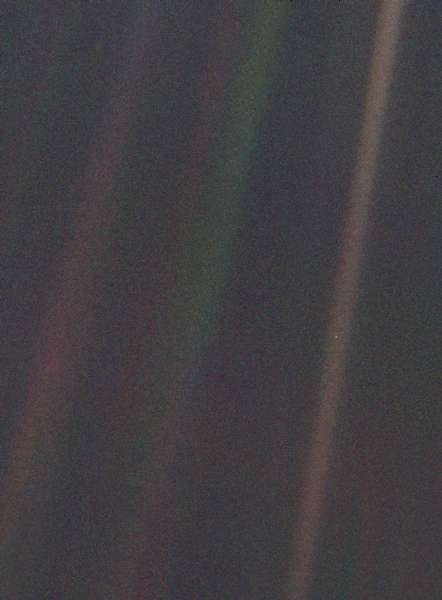
March 5, 2020, by UoN School of English
Review: The Emotional Impact of Pale Blue Dot
In times of stress or worry, I think it’s important to read literature that puts things into perspective. I am always drawn to “YOU ARE HERE”, a chapter in Carl Sagan’s Pale Blue Dot, the most reflective and emotionally impactful work of non-fiction I have read.
The chapter describes the journey NASA’s Voyager was making in 1990 away from Earth, and the decision to snap this photo for posterity—a snapshot of our home as a speck caught in a ray of sunlight. To Sagan, this photo becomes not only a signifier of our cosmic insignificance, but a case for the values of humility and kindness.
Sagan lays out the facts of life in the surrounding chapters: throughout history, humans have taken for granted a central position in the social and scientific universe. We have always led with the conceited assumption that we are special, central, significant; and each time, have been proven wrong. Our position in space is ordinary; our epoch negligible; we came from apes. Our scientific history is an endlessly repeated cycle of exercises in humility.
For some realising the maddening insignificance of being alive requires a severe form of denialism, but Sagan sees this truth as a thing of calming beauty. All our joy and suffering… every creator and destroyer of civilisation… every superstar and supreme leader… “on a mote of dust suspended in a sunbeam.” The truth brought out of this is the absolute futility and delusion of conceit: the fallacy of a superior race, a superior gender, of nationalism, narcissism and a Creator who resembles Man. The joy of reading Sagan’s work, and any other work of astronomy for that matter, is realising egalitarianism is echoed by the stars.
The image of the pale blue dot is a reminder of how precious life is, how delicate and ephemeral. Sagan’s lesson in the face of this is “to deal more kindly with one another, and to preserve and cherish the pale blue dot, the only home we’ve ever known.” These are words to live by.
Angus Forshaw is an English student at the University of Nottingham.
Image credit: NASA
No comments yet, fill out a comment to be the first

Leave a Reply